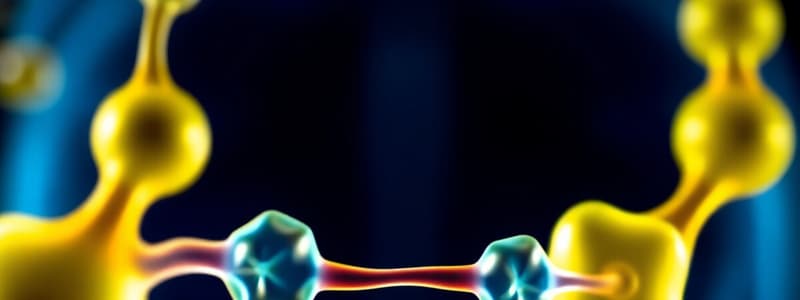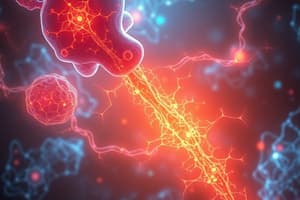Podcast
Questions and Answers
Which of the following hormones promotes protein synthesis?
Which of the following hormones promotes protein synthesis?
- Glucagon
- Growth Hormone (correct)
- Epinephrine
- Cortisol
Which of the following factors stimulates growth hormone secretion?
Which of the following factors stimulates growth hormone secretion?
- Stress (correct)
- REM sleep
- Free fatty acids
- High blood glucose
Which of the following hormones has an anti-lipolytic effect?
Which of the following hormones has an anti-lipolytic effect?
- Glucagon
- Epinephrine
- Cortisol
- IGF-1 (correct)
Which of the following is a direct action of growth hormone?
Which of the following is a direct action of growth hormone?
Which of the following hormones is most responsible for increasing free fatty acid levels in the blood?
Which of the following hormones is most responsible for increasing free fatty acid levels in the blood?
Which hormone levels are increased in a fasting state compared to the fed state?
Which hormone levels are increased in a fasting state compared to the fed state?
Which of these hormones is primarily responsible for promoting the storage of glucose in the fed state?
Which of these hormones is primarily responsible for promoting the storage of glucose in the fed state?
Which hormone is suppressed during starvation?
Which hormone is suppressed during starvation?
Which hormone is known to have a synergistic effect with both epinephrine and glucagon during extended fasting?
Which hormone is known to have a synergistic effect with both epinephrine and glucagon during extended fasting?
What is the primary effect of increased glucagon secretion in the fasting state?
What is the primary effect of increased glucagon secretion in the fasting state?
Which of these factors does NOT stimulate glucagon secretion?
Which of these factors does NOT stimulate glucagon secretion?
Which of these hormones acts on both the liver and muscle to stimulate glycogenolysis?
Which of these hormones acts on both the liver and muscle to stimulate glycogenolysis?
Which of these effects is NOT associated with cortisol's actions?
Which of these effects is NOT associated with cortisol's actions?
Which of these is a direct effect of glucagon in the liver?
Which of these is a direct effect of glucagon in the liver?
Which of these is a direct effect of epinephrine in the heart?
Which of these is a direct effect of epinephrine in the heart?
Which of these is a direct effect of cortisol in the adipose tissue?
Which of these is a direct effect of cortisol in the adipose tissue?
Which of the following hormones directly inhibits insulin secretion?
Which of the following hormones directly inhibits insulin secretion?
Which of these is a hallmark symptom of Addison's disease?
Which of these is a hallmark symptom of Addison's disease?
Which of these is a hallmark symptom of Cushing's syndrome?
Which of these is a hallmark symptom of Cushing's syndrome?
Which of these hormones enhances the effects of glucagon and epinephrine in the liver?
Which of these hormones enhances the effects of glucagon and epinephrine in the liver?
Flashcards
Fed State
Fed State
A metabolic state post-meal characterized by increased glucose and insulin levels, promoting storage of nutrients.
Fasting State
Fasting State
A metabolic state after not eating for a period, marked by low glucose and increased glucagon and epinephrine levels for fuel mobilization.
Role of Growth Hormone
Role of Growth Hormone
Hormone that increases during fasting and starvation to mobilize fuel and promote protein deposition in muscle.
Cortisol's Function
Cortisol's Function
Signup and view all the flashcards
Ketones in Starvation
Ketones in Starvation
Signup and view all the flashcards
Glucagon
Glucagon
Signup and view all the flashcards
Gluconeogenesis
Gluconeogenesis
Signup and view all the flashcards
Lipolysis
Lipolysis
Signup and view all the flashcards
Factors Stimulating Glucagon Secretion
Factors Stimulating Glucagon Secretion
Signup and view all the flashcards
Glucagon's Mechanism of Action
Glucagon's Mechanism of Action
Signup and view all the flashcards
Epinephrine
Epinephrine
Signup and view all the flashcards
Cortisol
Cortisol
Signup and view all the flashcards
Cortisol Excess (Cushing's Syndrome)
Cortisol Excess (Cushing's Syndrome)
Signup and view all the flashcards
Cortisol Deficiency (Addison's Disease)
Cortisol Deficiency (Addison's Disease)
Signup and view all the flashcards
Combined Hormonal Action During Fasting
Combined Hormonal Action During Fasting
Signup and view all the flashcards
Growth Hormone (GH)
Growth Hormone (GH)
Signup and view all the flashcards
Insulin-like Growth Factor 1 (IGF-1)
Insulin-like Growth Factor 1 (IGF-1)
Signup and view all the flashcards
Direct Actions of GH
Direct Actions of GH
Signup and view all the flashcards
Factors Stimulating GH Secretion
Factors Stimulating GH Secretion
Signup and view all the flashcards
Effects of Low GH Levels
Effects of Low GH Levels
Signup and view all the flashcards
Study Notes
Growth Hormone (GH)
- GH has various effects: sodium retention, decreased insulin sensitivity, lipolysis, protein synthesis (anabolic), bone growth stimulation, and IGF-1 secretion stimulation.
- GH and insulin are both anabolic hormones promoting protein synthesis, but insulin also promotes triglyceride and glycogen synthesis, unlike GH.
IGF-1 Functions
- IGF-1 mimics insulin's actions, has anti-lipolytic activity, and promotes protein synthesis.
GH Actions Summary
- Direct: Stimulates protein synthesis.
- Indirect: Promotes protein synthesis via IGF-1, stimulates bone growth, increases muscle protein synthesis, increases glucose production and gluconeogenesis in the liver, decreases insulin's effect on glucose uptake, increases lipolytic agent (e.g., epinephrine, glucagon) action, and raises free fatty acid and ketone levels.
GH Secretion Stimulators
- Hypoglycemia
- Stress
- Exercise
- Protein meals (amino acids like arginine)
- Sleep (onset)
- Androgens and estrogens
GH Levels Across Lifespan
- Highest during adolescence, second-highest in childhood, lower in adults, and lowest in the elderly.
Low GH Effects
- Reduced lean body mass, smaller protein mass, reduced bone mass.
GH Inhibitors
- Free fatty acids
- Cortisol
- Glucose
- REM sleep
- IGF-1
GH Effects on 16-Year-Old Boy
- GH increases both protein and glucose production.
Catabolic Hormones Overview
- These hormones (glucagon, epinephrine, cortisol) have a clear catabolic effect.
Glucagon
- Secretion: Pancreatic alpha cells, triggered by low glucose (fasting).
- Actions (Liver): Stimulates gluconeogenesis and glycogenolysis.
- Actions (Fat Tissue): Stimulates lipolysis.
- Synthesis: Processed from a large precursor molecule.
- Different cells produce different products due to varying enzymes.
- Pancreatic alpha cells produce: glucagon, MPGF, GPRP, GRPP
- Intestinal L cells produce: GLP-1 and other molecules
Glucagon Action Summary
- Stimulates glycogenolysis in the liver
- Stimulates gluconeogenesis
- Stimulates lipolysis
- Generates ketones
- Mobilizes energy stores
Increasing Glucose Output from the Liver
- Activates protein kinase A
- Stimulates glycogen breakdown
- Inhibits glucose metabolism
- Maintains glucose levels by releasing from glycogen, preventing further decrease
Increasing Lipolysis in Fat Tissue
- Activates hormone-sensitive lipase
- Accelerates triglyceride breakdown into glycerol and free fatty acids
Glucagon Secretion Stimulators
- Amino acids
- GI hormones (CCK, gastrin)
- Cortisol
- Exercise
- Infection
- Fasting
Glucagon Secretion Inhibitors
- Glucose
- Free fatty acids
- Ketones
- Secretin
- Insulin
- Somatostatin (inhibits glucagon and insulin)
- Alpha-adrenergic stimulation
- Beta-adrenergic stimulation (stimulates glucagon)
Epinephrine
- Production: Adrenal medulla
- Actions: Glycogenolysis (liver and muscle), stimulates gluconeogenesis, decreases glucose uptake, stimulates lipolysis, stimulates ketogenesis, mobilizes energy stores.
Epinephrine Release Stimulators
- Anxiety, fear, pain, hypoglycemia, hypotension, hypovolemia, hypothermia, hypoxia, exercise
Epinephrine Receptor Effects
- Beta-1 (Heart): Increases heart rate, stroke volume, cardiac output, blood pressure
- Alpha-1 (Vascular smooth muscle): Vasoconstriction
- Beta-2 (Skeletal muscle): Vasodilation
- Beta-2 (Liver): Glycogenolysis
- Alpha (Liver): Gluconeogenesis
- Beta-2 (Adipose Tissue): Lipolysis
- Beta-2 (Skeletal Muscle): Glycogenolysis
- Alpha (Pancreas): Inhibits insulin
- Beta-2 (Pancreas): Stimulates glucagon
Cortisol
- Stimulation Factors: Pain, low glucose, low blood pressure, low volume, low temperature, low oxygen, exercise
- Actions (Liver): Enhances norepinephrine and glucagon on gluconeogenesis
- Actions (Adipose Tissue): Promotes lipolysis
- Actions (Skeletal Muscle): Facilitates protein breakdown and glycogenolysis
- Glucocorticoid effects: Inhibit calcium uptake in the gut, bone formation, collagen synthesis, and IGF-1 actions on bone and muscle.
Glucocorticoids Net Effects
- Inhibits growth
- Decreases stature in children
- Causes osteoporosis and muscle atrophy in adults
Combined Catabolic Effects (Glucagon, Epinephrine, Cortisol) During Fasting
- Hypoglycemia triggers glucagon and epinephrine release.
- Glucagon and epinephrine stimulate gluconeogenesis and glycogenolysis to increase glucose production.
- Cortisol enhances glucagon and epinephrine effects by synthesizing enzymes and has a slower effect.
- Increases glycogen storage, breaks down skeletal muscle protein.
Cortisol Excess (Cushing's Syndrome)
- Hyperglycemia, insulin resistance, protein wasting, poor wound healing, truncal obesity, hypertension, hypervolemia, hypernatremia, hypokalemia, increased infection susceptibility, reduced inflammatory response, euphoria.
Cortisol Deficiency (Addison's Disease)
- Hypoglycemia, low blood pressure, poor response to angiotensin II, low volume and sodium, high potassium, depression, skin hyperpigmentation (due to elevated ACTH and MSH).
Hormonal Changes in Different Metabolic States
- Fed State: Increased glucose, insulin, glucagon (due to amino acids), and baseline epinephrine, GH, and cortisol; net effect: absorption and storage.
- Fasting: Decreased glucose, insulin, increased glucagon, epinephrine, GH, and cortisol; net effect: mobilization of stored fuel.
- Extended Fasting: Decreased glucose, insulin, increased glucagon, epinephrine, GH, and cortisol; ketones become a fuel source.
- Starvation: Very low glucose, insulin, suppressed glucagon, increased epinephrine, GH, and cortisol.
Studying That Suits You
Use AI to generate personalized quizzes and flashcards to suit your learning preferences.




